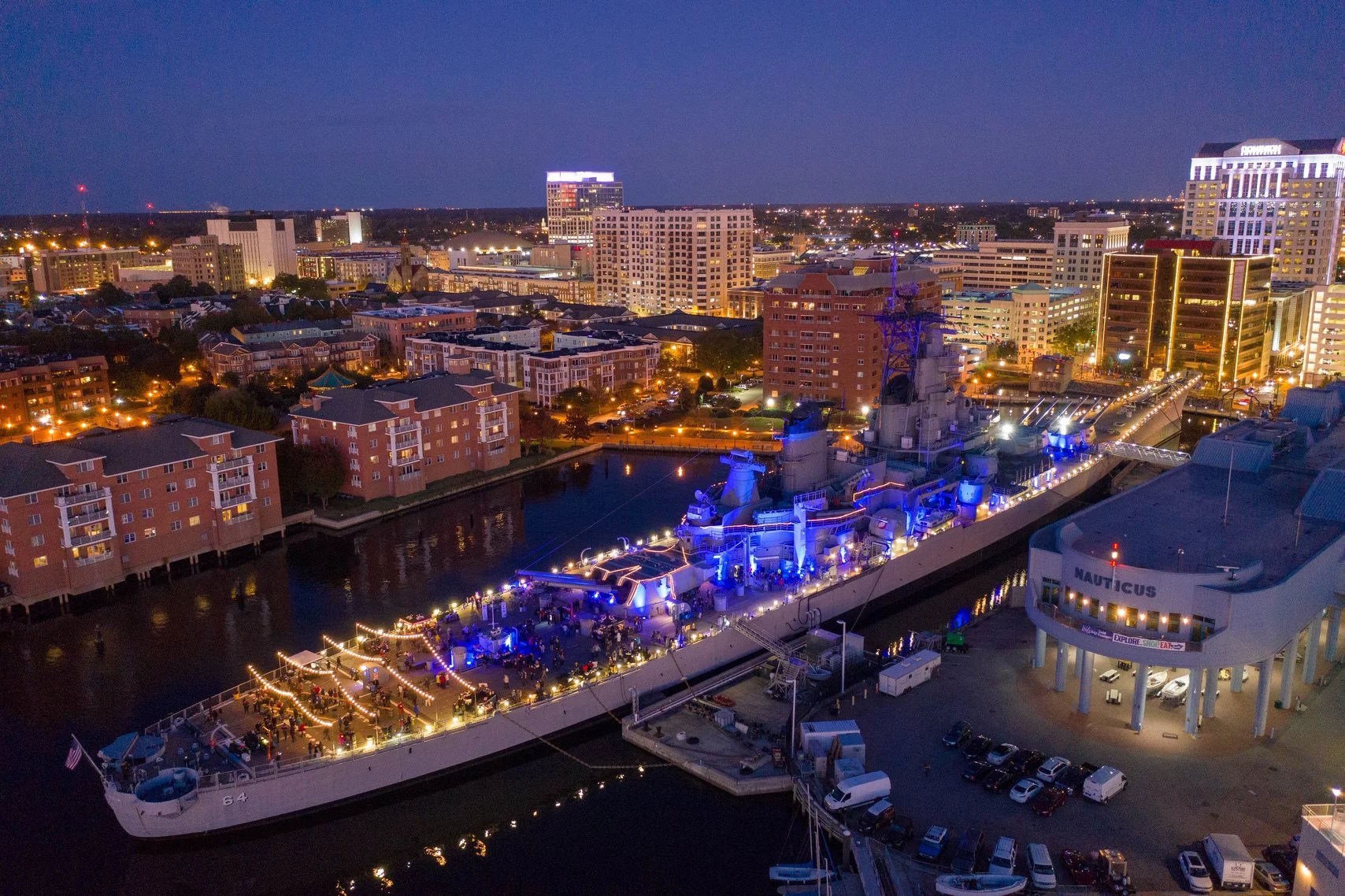Norfolk is the cultural heart of the Hampton Roads region. In addition to its museums, Norfolk is the principal home for several major performing arts organizations. The city hosts numerous annual festivals and parades, many in Town Point Park.
Downtown Norfolk has several museums of national significance. The nationally acclaimed Chrysler Museum of Art is the area's most comprehensive art museum. Since opening in 1933, the museum's main building has been expanded six times to allow for larger glass galleries, generous space for Impressionist and Baroque works, and more. The MacArthur Memorial, located in the nineteenth-century Norfolk courthouse and city hall in downtown, contains the tombs of General Douglas MacArthur and his wife, a museum and a vast research library with his personal belongings. Nauticus, the National Maritime Center, opened on the downtown waterfront in 1994. Since 2000, Nauticus has been home to the battleship USS Wisconsin, the last battleship to be built in the United States. It served briefly in World War II and later in the Korean and Gulf Wars.

Norfolk
Norfolk is an independent city in Virginia, United States. Incorporated in 1705, it had a population of 238,005 at the 2020 census, making it the third-most populous city in Virginia after neighboring Virginia Beach and Chesapeake, and the 94th-largest city in the nation. Norfolk holds a strategic position as the historical, urban, financial, and cultural center of the Hampton Roads region, which has more than 1.8 million inhabitants and is the 37th-largest metropolitan area in the United States. The region is sometimes called "Tidewater" and "Coastal Virginia" or "COVA," although these are broader terms that also include Virginia's Eastern Shore and entire coastal plain. Named for the eponymous natural harbor at the mouth of the Chesapeake Bay, Hampton Roads has ten cities, including Norfolk; seven counties in Virginia; and two counties in North Carolina.
Bordered to the west by the Elizabeth River and to the north by the Chesapeake Bay, the city shares land borders with the independent cities of Chesapeake to its south and Virginia Beach to its east. With coastline along multiple bodies of water, Norfolk has many miles of riverfront and bayfront property, including beaches on the Chesapeake Bay. The coastal zones are important for the economy. The largest naval base in the world, Naval Station Norfolk, is located in Norfolk along with one of NATO's two Strategic Command headquarters. Additionally Norfolk is an important contributor to the Port of Virginia. It is home to Maersk Line, Limited, which manages the world's largest fleet of US-flag vessels. This low-lying coastal infrastructure is very vulnerable to sea level rise, with water levels expected to rise by more than 5.5 feet by the end of the 21st century.
The city has a long history as a strategic military and transportation point, where many railroad lines started. It is linked to its neighbors by an extensive network of interstate highways, bridges, tunnels, and three bridge-tunnel complexes.
Living in Norfolk
The revitalization of downtown Norfolk has helped to improve the Hampton Roads cultural scene. Many of Norfolk's attractions are now connected by the 10.5-mile long Elizabeth River Trail, a pedestrian and bike trail that winds along the city's waterfront. The trail's first segment of opened in 2003 on land donated by Norfolk Southern. A large number of clubs, representing a wide range of music interests and sophistication now line the lower Granby Street area. The nearby Waterside Festival Marketplace has also continued to be successful as a nightclub and bar venue. Norfolk celebrates the rich ethnic diversity of its population with sights, sounds, attractions and special events that pay tribute to the city's long multicultural heritage.
Norfolk has a variety of parks and open spaces in its city parks system. The city maintains three beaches on its north shore in the Ocean View area. Norfolk has two universities with Division I sports teams — the Old Dominion Monarchs and the Norfolk State University Spartans. Norfolk also serves as home to the two highest level professional franchises in the state of Virginia — the Norfolk Tides play baseball in the International League, and the Norfolk Admirals play ice hockey in the ECHL.
Norfolk has a variety of historic neighborhoods, notably Freemason and West Freemason. Some neighborhoods, such as Berkley, were formerly cities and towns. Others, including Willoughby Spit and Ocean View, have a long history tied to the Chesapeake Bay. The city's revitalization in recent decades has transformed neighborhoods such as Downtown, Ghent and Fiarmount Park. Popular residential neighborhoods include Ghent, Colonial Place, Larchmont, North Shore, Edgewater, and Lafayette Shores.
Things to Consider
When choosing a community to live in, the best area for you, might look very different than for someone else. Here are some things to always consider while you are searching.
Commuting - Be aware of travel times? Rush hour traffic in the Hampton Roads area along with the tunnels and bridges should always be considered when choosing a location.
School Districts - If you have children in the public schools you will want to check out Great Schools.org to help you when selecting a neighborhood.
Community - Are you looking for a neighborhood with amenities like clubhouse, swimming pool, community activities, boat or water access?
Resale - It is always wise to consider resale when you are looking for your home. Location is important is as important as home features.


